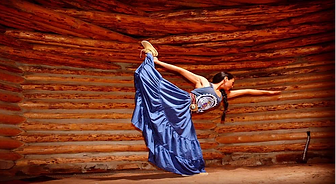COURSES & EVENTS

Decolonizing Yoga: Indigenous & Ally Perspectives
GTUx at Graduate Theological Union
Berkeley, CA
Laura M. Dunn, Ph.D., GTU
Haley Laughter, Hozho Total Wellness
Laura Toyofuku-Aki, Project Koa Yoga
Tria Blu Wakpa, Ph.D., UCLA
In recent years, the term "decolonization" has been used to describe various social justice initiatives aimed at dismantling systems of institutional and systemic oppression in areas such as education, research, science, and healthcare. At the same time, indigenous communities understand decolonization as the reclamation of land and self-determination from Western imperialism. The divergence between these two interpretations of decolonizing yoga highlights the need for greater clarity regarding its meaning for different groups. Without establishing coherence among its disparate meanings and intentions, the term and its associated efforts risk losing their impact and becoming diluted.
The popularity of decolonization as a conceptual framework has also influenced Modern Postural Yoga. Today, individuals can participate in yoga classes and teacher trainings that focus on decolonization. In most cases, "decolonizing yoga" refers to the implementation of pedagogies that aim to restore yoga to its cultural and philosophical South Asian origins. Yet, some indigenous communities utilize yoga for decolonization as an embodied practice for healing trauma and reclaiming bodies and identities historically regulated by colonial powers. This reclamation of self and body is seen as an essential component for the liberation of spirit and flesh from oppression.
The indigenous use of yoga for decolonization provides examples of how different meanings and applications of decolonization can align around shared values such as liberation, non-violence, and ecological sustainability. Engaging in a conversation with Haley Laugher, a Navajo yoga teacher and founder of the Indigenous Yoga Instructors Association, Laura Toyofuku-Aki, Native Hawaiian co-founder of Project Koa Yoga, and Dr. Tria Blu Wakpa, an assistant professor of Dance Studies in the Department of World Arts and Cultures/Dance at UCLA, Dr. Dunn delves into the concept of "decolonizing yoga" from indigenous and ally perspectives. This dialogue illustrates how yoga and decolonization initiatives can harmonize within a holistic indigenous framework for liberation, which perceives the spiritual, individual, material, and social realms as inseparable and interconnected.



Modern Yoga: transmission lineages, interpretations, appropriations
Past Events

June 29, 2019
Patanjali & Samkhya Yoga
Open Space Yoga
Honolulu, Hawaii
In this four-hour workshop, we will examine the concepts in Sāṃkhya philosophy that form the basis of Patañjali’s yoga, such as: the nature of spirit and matter, suffering, and liberation. During this introduction to these foundational concepts of Sāṃkhya and Patañjali participants are invited to think and feel more deeply about one’s relationship to the body, the world, and the divine. In addition to lecture, this workshop will include time for introspection, group discussion, and personal reflection.

July 20, 2019
Hatha Yoga and the Tantric Body: Freedom & Embodiment
Open Space Yoga
Honolulu, Hawaii
This workshop explores Tantric Yoga as the backdrop upon which Modern Yogas have been rendered. We will discuss what “Tantra” actually means, it’s vision of embodied liberation, and the many theories and practices that have merged with Haṭha Yoga, making their way cross-continentally across a millennium into the minds and bodies of people across the globe.

September 28, 2019
Modern Yoga: transmission lineages, interpretations, appropriations
Open Space Yoga
Honolulu, Hawaii
The aim of this workshop is to bring awareness to yoga’s indigenous roots and its modern-day significance. The lecture in part one gives an overview of premodern yoga as well as modern postural yoga’s origination in British India. Part two of the workshop is comprised of lecture, discussion, and personal reflection as we explore modern yoga lineages, ethics, Western interpretations, and appropriations of yoga philosophies and practices. Yoga teachers concerned with cultural responsibility and accountability are encouraged to take this course as part of our discussion focuses on the importance of ethics and inclusivity in the modern yoga classroom.

August 10, 2019
Shakti, Devī, and Yoginī
Open Space Yoga
Honolulu, Hawaii
Unlike the Yoga of Patanjali which conceives of a duality between spirit and matter, Hatha and Tantra Yoga-s espouse a vision of unity, in which the body becomes a temple and abode for the divine through various yoga practices. In this four-hour workshop, we look at particular Vedas and Tantras that espouse a holistic view of body, self, and spirit as well as learn various pranayama and meditative techniques that are intended to cultivate an awareness of Shakti in the body. Participants are invited to reflect upon how these teachings and practices can foster true self-love, thereby engendering a deeper connection to others and the planet.